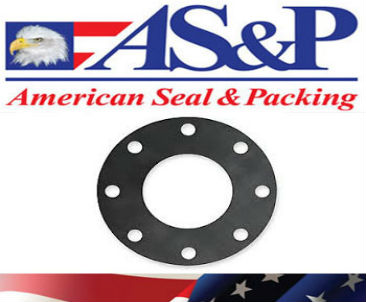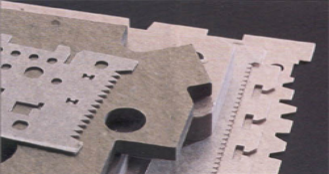Gasket
Gaskets are commonly produced by cutting from sheet gasket materials, such as gasket paper (beater addition), Non-asbestos, Rubber, EPDM, Nitrile, Buna, Neoprene, Flexible Graphite, Grafoil, Aflas, Kalrez, Viton, Silicone, Metal, Mica, Felt or a plastic polymer such as PTFE, Peek, Urethane, or Ethylene Propylene (EP). In the past, the gasket material selected for specific applications may contain have contained asbestos.
Today's sealing products manufacturer's include: FMI, Garlock, Thermoseal (Klinger), Teadit, and Durlon. In the United States they longer produce or offer any asbestos containing products. Gasket materials containing asbestos have been claimed to have caused Asbestosis. Of course it would take the grinding of gasket material to release the fibers and then the breathing in of those fibers....possible but in the real world this would be rare. Wetting or oiling a gasket before grinding for removal greatly reduces any risk (not grinding is even better). Asbestos gasket material is still used in most of the rest of the world and is a very effective low cost material.
It is usually desirable that the gasket be made from a material that is compressible such that it tightly fills the space it is designed for, including any slight irregularities. The most common misconception when selecting a gasket materials thickness is to choose a gasket material that is too thick. The thicker the material the more likely the material being contained can weep through the pores of the gasket material itself. This is a greater issue with some materials than others. A rule of thumb is to have the material thick enough to compensate for any surface face irregularities and to permit some compression. The required compression for your gasket material will depend on many factors including:
- Surface area
- Pressure being sealed
- Size of bolts (assuming bolts are being used)
- Number of bolts
- Condition of the bolts
- Lubrication on the bolts
All must be considered when determining torque. Torque data must be determined using all of the above and should be provided by an engineer. In most cases unless your gasket is a standard ANSI or API flange using Ring or Full Face gaskets torque data will be difficult to come by (due to staffing and the fear of law suits). In most cases the old tighten it tight enough to stop any leaks but not too tight as to completely crush the gasket is generally accepted.
Gasket Materials
Over compression removes the ability to recover. This is also true of expanded PTFE, once over compressed it will have no recovery and therefore will not longer adapt to maintain a seal. The common strategy of "The more compressive load exerted on the gasket, the longer it will last" is generally true of elastomeric materials since elastomers (rubbers) are not compressible but deflect compression. Many materials such as non-asbestos compressed gasket materials and beater addition (ie; Armstrong) materials contain elastomers in the mix of material they are produced from, making them difficult to over compress.
One of the more desirable properties of an effective gasket material in industrial applications is the ability to withstand high compressive loads. Most industrial gasket applications involve bolts exerting compression well into the 14 MPa (2000 psi) range or higher. This is why Non-asbestos gasket materials are so widely used in industrial gasket material applications.












